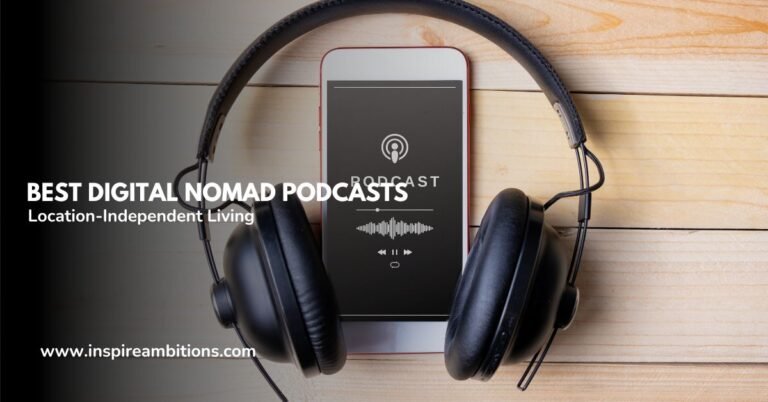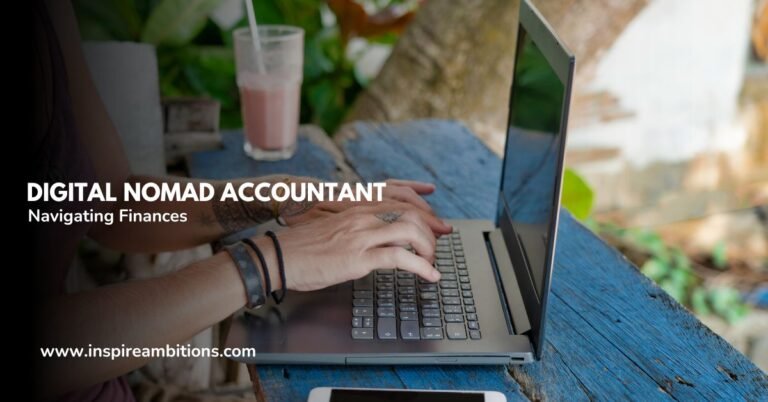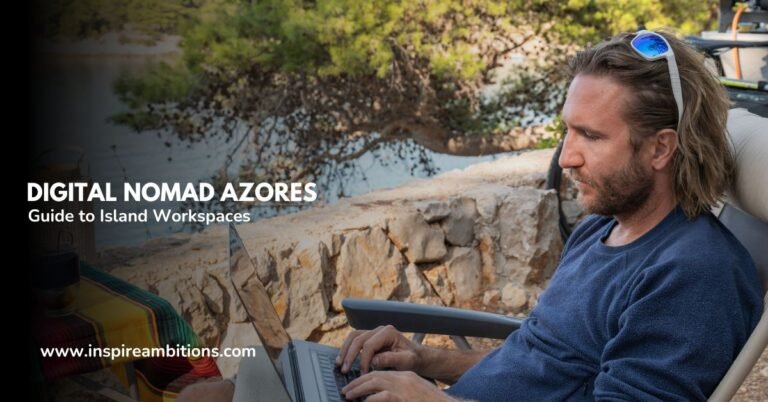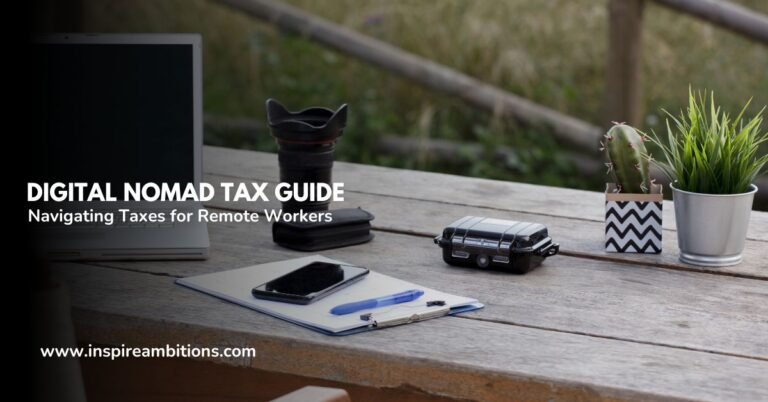Tips for Being a Digital Nomad – Essential Strategies for Success
Embracing the digital nomad lifestyle is akin to having the world as your office. With a laptop and a reliable internet connection, the promise of exploring far-flung locales while meeting your professional goals is no longer just a dream. Preparing up your work to head to a bustling city or a tranquil beach can be liberating but requires preparation and adaptability.

As you embark on this journey, you’ll discover that becoming a digital nomad is as much about your mindset as your destination. It’s about blending work with travel, not mixing them up.
Finding the right places to settle, forging connections with local and international communities, and managing your finances take a new dimension. Ensuring you have the right tools and strategies for productivity, alongside understanding the legalities of your new lifestyle, is vital for a successful transition.
Tips for Being a Digital Nomad – Key Takeaways
- Remote work unlocks the potential to explore and live in various locations while fulfilling professional duties.
- Building a network and integrating into local communities is essential for a sustainable digital nomad lifestyle.
- Proper planning and practical tools ensure work-life balance, productivity, and continuous skill development.
Getting Started
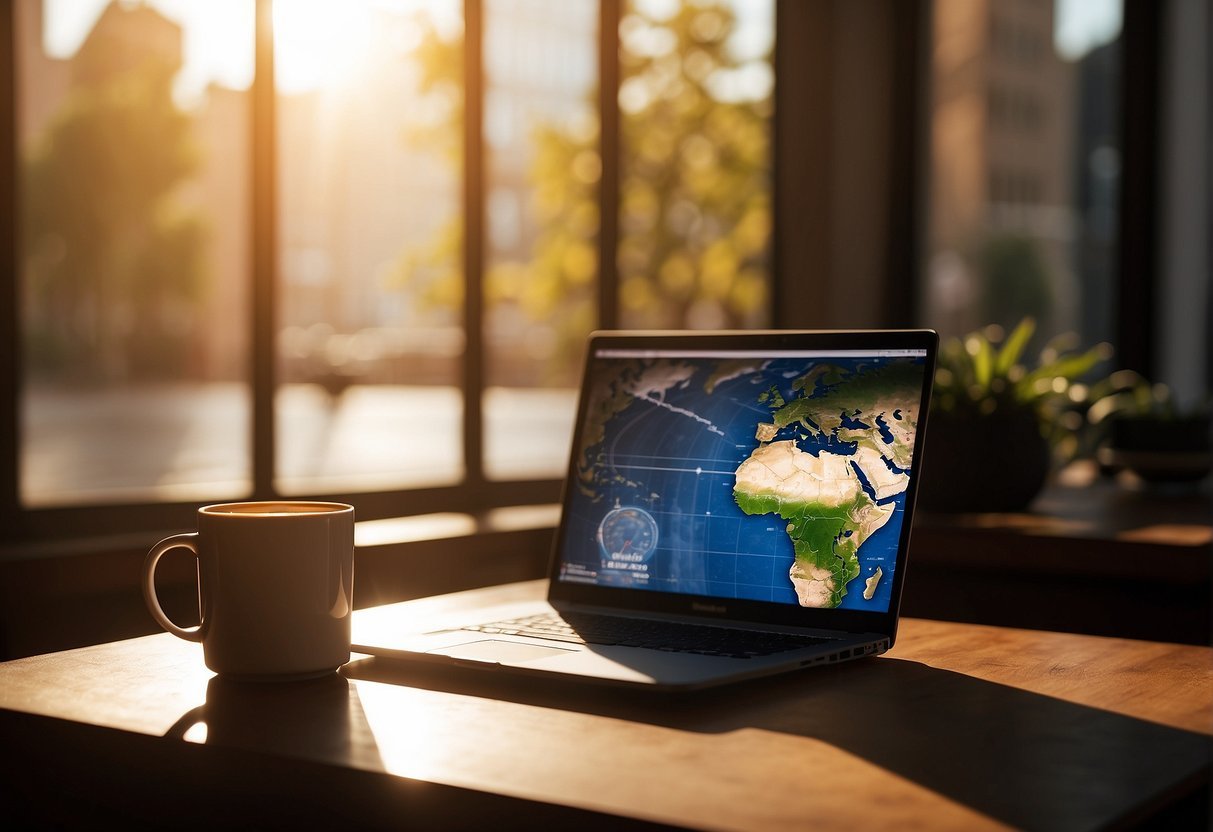
Embarking on the journey of a digital nomad requires a fundamental understanding of what this lifestyle entails and the essentials needed to work remotely.
Understanding the Digital Nomad Lifestyle
A digital nomad uses technology to work remotely and live a nomadic lifestyle. This lifestyle lets you choose your work environment, whether a beach in Bali or a café in Paris. The key to this lifestyle is flexibility; however, it also demands high discipline and self-motivation.
Why choose this lifestyle? People are drawn to becoming digital nomads for various reasons, including the desire to travel, a flexible schedule, or a better work-life balance.
Necessities for Remote Work
To successfully work remotely as a digital nomad, specific tools and conditions are non-negotiable:
- Laptop: Your most essential tool. Ensure it’s reliable, portable, and powerful enough to handle your work tasks.
- Internet: A fast and secure internet connection is crucial for staying productive and connected with clients or colleagues. Consider investing in a mobile hotspot for times when WiFi isn’t available.
Remote workers often use online tools and platforms to manage their work and stay organised. This can include project management apps, cloud storage, and communication tools to keep in touch with teams or clients.
By understanding what it means to live as a digital nomad and preparing with the necessary tools, you can take the first step towards a life of freedom and remote work.
Finding the Right Locations
When it comes to succeeding as a digital nomad, the power of location cannot be overstated. Not only can the right place enhance your productivity and work-life balance, but it can also enrich your personal experiences.
Cultural Considerations
Every location has cultural nuances that can impact your living and working experience. Destinations like Thailand and Bali offer a serene beachside backdrop mixed with vibrant local traditions that may be appealing if you seek a tranquil environment intertwined with cultural exploration. Cities like Lisbon or Paris, on the other hand, present a European cultural experience with a history-rich environment.
Mexico and Spain are known for their warm hospitality and lively community life. While choosing, consider how local customs, holidays, and the social climate can align with your lifestyle and work routine.
Internet Connectivity and WiFi Availability
For a digital nomad, reliable internet is non-negotiable. Locations famed for their digital nomad-friendly atmosphere, such as Chiang Mai or Lisbon, offer a plethora of cafes and coworking spaces with excellent WiFi. In contrast, more remote destinations may pose connectivity challenges.
Always check your desired area’s WiFi speeds and availability before settling down. Additionally, consider the time zone differences; working in South Africa might offer a better alignment with European clients compared to the time zones in Bali or Thailand.
Accommodations and Living Arrangements
As you venture into the nomadic lifestyle, finding suitable accommodations can significantly impact your productivity and overall experience. Unlike a traditional hotel stay, which might offer luxury at the cost of impersonality, many options cater to the unique demands of being a digital nomad.
Airbnb has become a popular choice for digital nomads searching for short-term rentals. It’s a platform to find a place to stay and experience a city like a local. With a vast array of worldwide options, you can select spaces that offer the amenities crucial for your work, like high-speed internet and a dedicated workspace.
For longer-term solutions, consider leasing apartments or houses—a choice that can be cost-effective and comforting. This gives you the stability to focus on your work without the uncertainty of frequent moves.
Short-Term Stays
- Airbnb: Ideal for stays from a few days to a few weeks.
- Hostels: Economical for brief visits and meeting fellow travellers.
- Bold__Co-living spaces__: Offer community and collaboration opportunities.
Long-Term Accommodation
- Search for multi-month rentals that can be more economical.
- Investigate services that specialise in more extended stays, like Apartments.com.
- Consider Facebook groups and expat communities for private lets.
Finding the right balance between comfort, cost, and conveniences like internet reliability. Not every accommodation will be perfect, but with research, you may find places that feel like a home away from home. Prioritise your needs, and remember that the best accommodation serves your work and well-being.
Networking and Community
In the life of a digital nomad, building a solid network and finding a community can make the difference between feeling isolated and enjoying a thriving professional and social life.
Building a Remote Work Network
Creating a resilient remote work network is essential to succeed as a digital nomad. Attend networking events and engage in online forums to meet fellow nomads who can offer advice, support, and business opportunities. Utilise platforms like Nomad List to stay updated on the latest digital nomad hotspots and events.
- Regular Meetups: Attend local meetups or coworking events where you’re based.
- Virtual Events: Participate in webinars and virtual conferences relevant to your field.
Finding Digital Nomad Communities
Discovering digital nomad communities provides a sense of belonging and can help ease the transition into a nomadic lifestyle. Coworking spaces often act as hubs for these communities, offering a place to work, socialise and collaborate.
- Social Media Groups: Joining groups on platforms like Facebook can connect you with local and global nomads.
- Local Community: Engage with the community to gain unique insights and forge lasting relationships.
Build your network and immerse yourself in communities that align with your lifestyle and values for a fulfilling digital nomad experience.
Managing Finances
Proper financial management is vital for digital nomads, who often contend with various currencies and the fluctuating costs associated with international travel. Smart budgeting and effective use of financial tools can make the difference between a sustainable nomadic lifestyle and unexpected financial challenges.
Budgeting and Cost of Living
Key Concepts: Accurate budgeting is crucial for remote workers and freelancers who require a firm grasp of their monthly inflow and outflow of cash to maintain a stable business operation.
- Cost of Living: Before moving, research the cost of living in potential destinations, considering rent, groceries, transportation, and leisure activities.
- Budget Creation: List all income streams and estimate monthly expenses. Include a buffer for unexpected costs such as emergency travel or healthcare.
Banking and Using Credit Cards Abroad
Banking: Maintain a reliable banking setup that fits a mobile lifestyle.
- International Bank Accounts: Consider banks that offer multi-currency accounts or are favourable for overseas transactions.
- Online Banking: Use online banking services that provide real-time access to your finances, aiding in swift management and transfers.
Credit Cards Abroad:
- Travel Credit Cards: Opt for travel credit cards that offer benefits like no foreign transaction fees and travel rewards.
- Foreign Transaction Fees: Be vigilant about cards charging foreign transaction fees, which can add up.
Insurance:
- Travel Insurance: Always invest in comprehensive travel insurance that includes health coverage to protect against potential risks inherent in frequent travel.
Integrating these specific financial management approaches into your nomadic lifestyle optimises your financial health, allowing for a more focused and enjoyable experience as you traverse the globe.
Legal Matters and Insurance
Legal compliance and appropriate insurance are critical components when embarking on the digital nomad lifestyle. As a digital nomad, you may face unique legal and insurance challenges that require careful planning.
Understanding Legal Requirements
- Business Structure: Evaluate and select the appropriate business structure that supports your nomadic lifestyle. This choice impacts your taxes, liability, and operational flexibility.
- Abiding by Local Laws: Research and adhere to the laws governing work and residency in each country you visit.
- Tax Obligations: Understand and fulfil your tax responsibilities in your home country and any country you work from.
Ensuring Adequate Insurance Coverage
- Health Insurance: Securing health insurance that covers you internationally is paramount. Consider plans tailored to digital nomads, such as those offered by SafetyWing, which include coverage for pandemics.
- Travel Insurance: Opt for comprehensive travel insurance that protects you from travel-related risks, including trip cancellations or lost luggage.
- Liability Insurance: If you offer services or advice in your work, consider obtaining professional liability insurance.
Note: Insurance needs differ for each individual. Evaluate your specific requirements by consulting with an insurance expert who understands the nuances of a nomadic lifestyle.
Work-Life Balance and Productivity
Achieving a harmonious work-life balance as a digital nomad is imperative for productivity and mental health. A well-structured routine and attention to your psychological well-being can be the keystones of sustaining success in your nomadic lifestyle.
Creating a Routine
Initiating your day with a consistent routine establishes much-needed structure, which can be a challenge in the fluid lifestyle of a digital nomad. Begin with well-defined work hours to compartmentalise your professional and personal life, helping to enhance focus during work times and relaxation during off times. To manage tasks effectively, consider using tools like Trello or Asana, which can help you keep track of your daily responsibilities and deadlines.
Example: If you typically wake up at 7 am, dedicate the first hour to personal care, then set 8 am to 12 pm for focused work, followed by a break for lunch and relaxation.
Maintaining Mental Health
Staying mindful of your mental health is crucial, given the isolating aspects of digital nomadism. Regular breaks, social interactions, and self-care practices prevent burnout. Incorporating meditation, exercise, or exploring your current locale can contribute to a positive state of mind.
Remember: Take breaks away from your screen every 90 minutes to rejuvenate — a brisk walk or a brief meditation session can work wonders for your mental clarity.
Work Tools and Technology
Having the right tech arsenal is essential when embarking on a digital nomad lifestyle. From staying connected to managing remote work, these tools are your bridge to a successful nomadic career.
Essential Equipment for Remote Work
Laptop: Your laptop is the cornerstone of your mobile office; choose a lightweight and robust model for optimal efficiency.
WiFi & SIM Card: Ensure you have a stable internet connection with a reliable data plan; a portable WiFi device and local SIM card can be lifesavers.
VPN: Security isn’t optional, so use a VPN to protect your privacy and access services regardless of geographic restrictions.
Noise-Cancelling Headphones: Invest in quality noise-cancelling headphones for focus and privacy in noisy environments.
Software and Online Platforms
Communication Tools: Stay in touch with clients and colleagues using Skype or other video conferencing tools.
Workspace: Leverage online workspace platforms that offer tools to collaborate remotely and manage your projects effectively.
Task Management: Tools such as Trello and Notion organise your tasks and improve productivity.
Financial Management: Keep your finances in check on the go with apps designed for tracking expenses and budgeting.
Growing Your Skills and Business
To thrive as a digital nomad, it’s vital to focus on expanding your expertise and entrepreneurial endeavours. Progress in these areas can translate to more opportunities and financial stability.
Continual Learning and Upskilling
Key Point 1: For freelance software developers, writers, and designers, staying competitive means being on top of the latest trends and technologies in your field. Consider online courses or certifications to enhance your web development, content creation, or graphic design abilities.
- Example: A graphic designer could take an advanced Adobe Creative Suite course to improve their design skills, which can help secure higher-paying projects.
Starting and Marketing Your Own Business
Key Point 2: When starting a business, whether it’s in consulting, freelance writing, or design, establish a robust online presence through strategic marketing. Utilise social media, content marketing, and SEO to attract and retain clients.
- Personal Experience: As a digital marketer, I leveraged LinkedIn to showcase my expertise, connect with potential clients, and build a network that resulted in repeat business and referrals.
Case Studies and Resources
Exploring the lives of successful digital nomads can provide you with both inspiration and practical advice—websites such as We Work Remotely and Remote. Co are hubs for securing remote work, essential for maintaining a steady income while travelling.
Travel Blogs: A travel blog often shares personal experiences and can be a treasure trove of firsthand information. Lora from Explore With Lora provides actionable digital nomad tips to help you succeed in 2024, showing how to live this lifestyle sustainably.
Books:
- The 10 Best Books for Digital Nomads provides a curated list to deepen your understanding of digital nomad life. Discovering literature from those who have thrived in remote work will enhance your skills and mindset.
Resources: Here are some resources to help guide your journey:
- Websites: FlexJobs for finding flexible job listings.
- Blogger Insights: Draw on insights from bloggers who’ve transitioned to digital nomadism.
- Communities: Engage with other digital nomads through forums and social media groups to share experiences and advice.
By studying case studies and leveraging a wide array of resources, you can navigate the transitioning phase to become a proficient digital nomad. Remember, persistence and continual learning are your allies on this journey.

